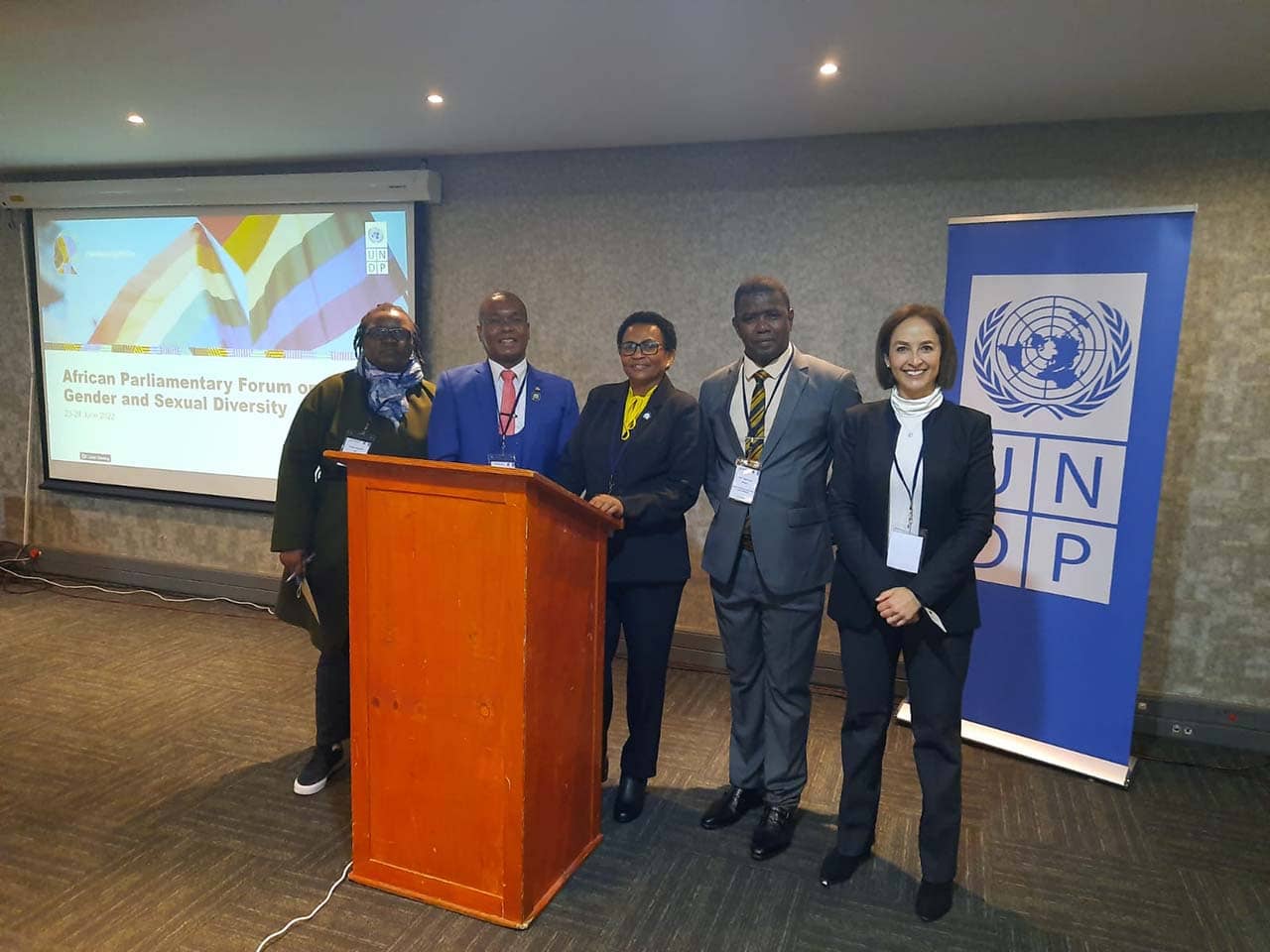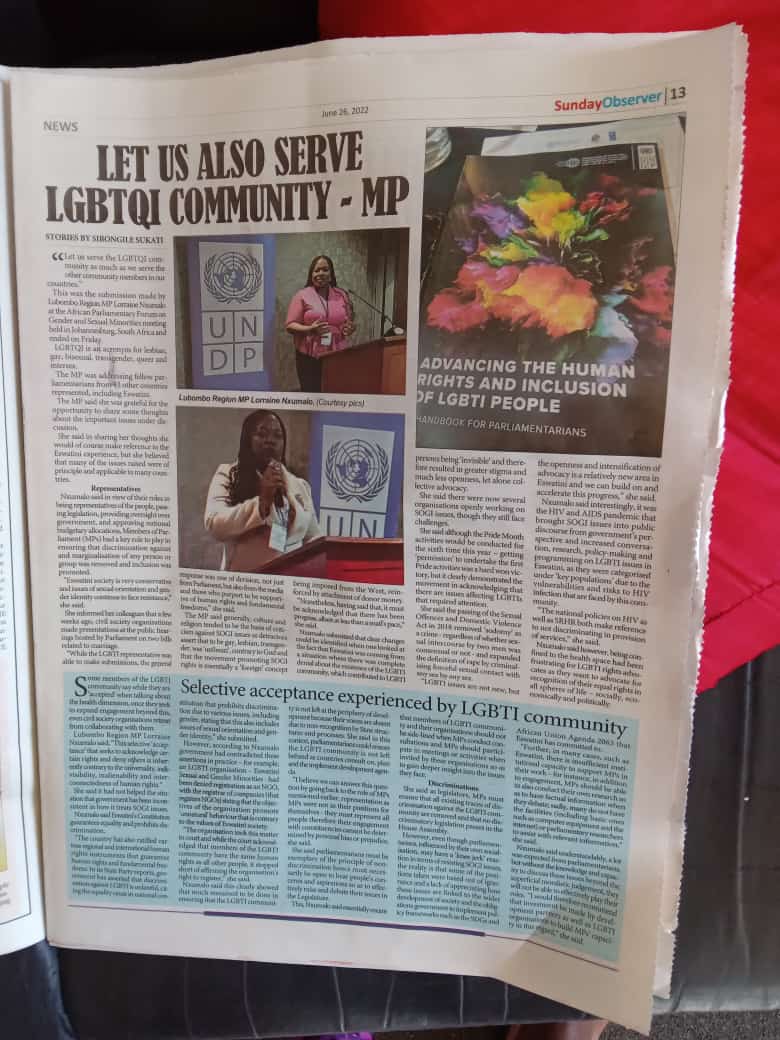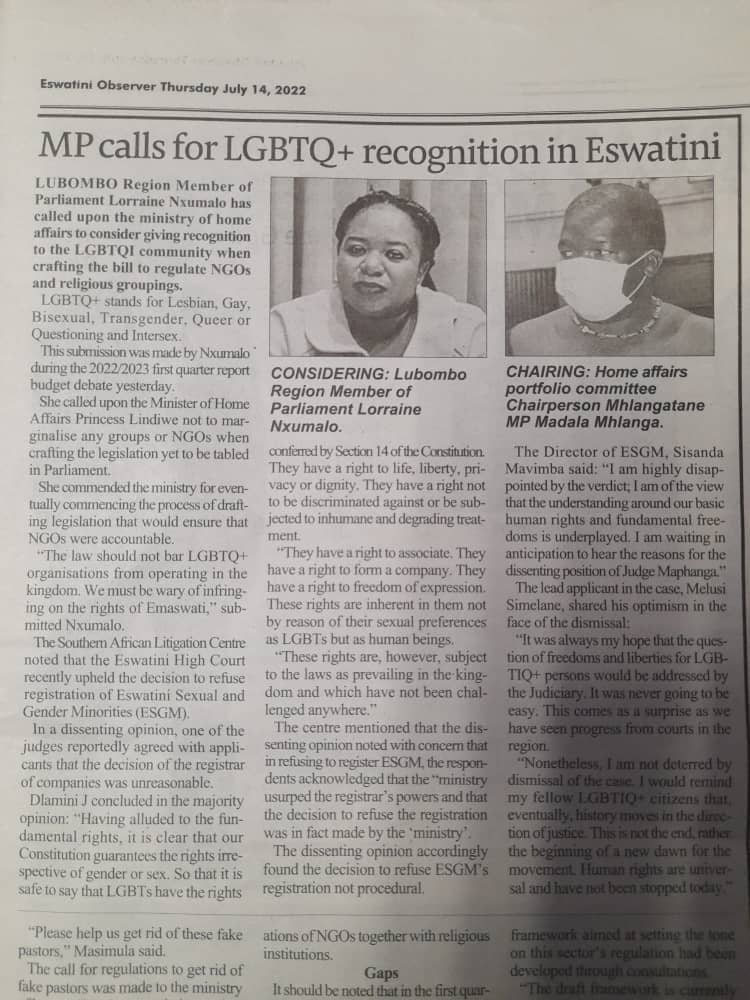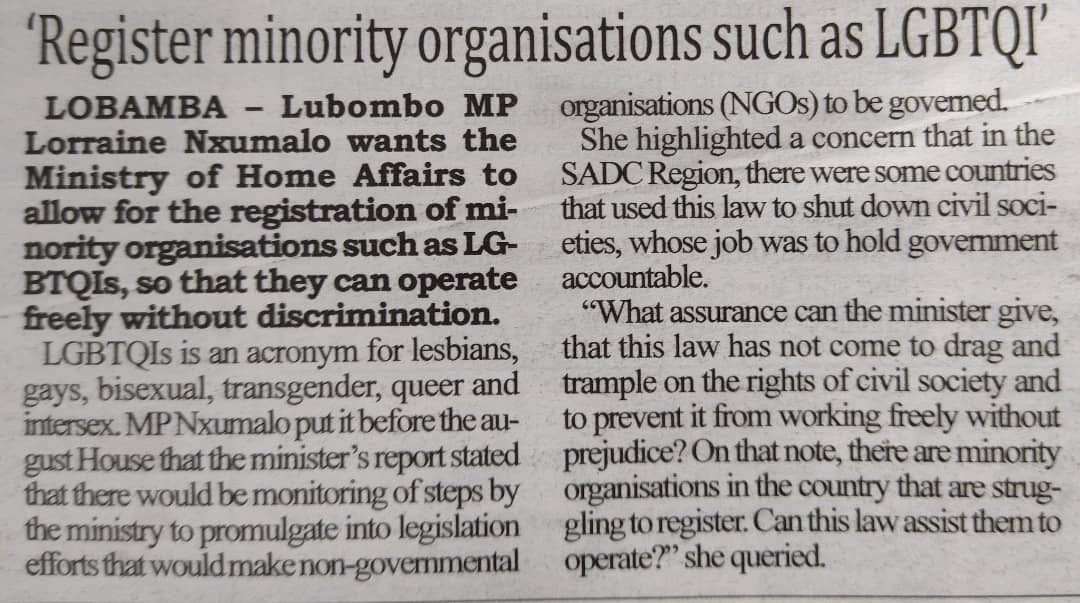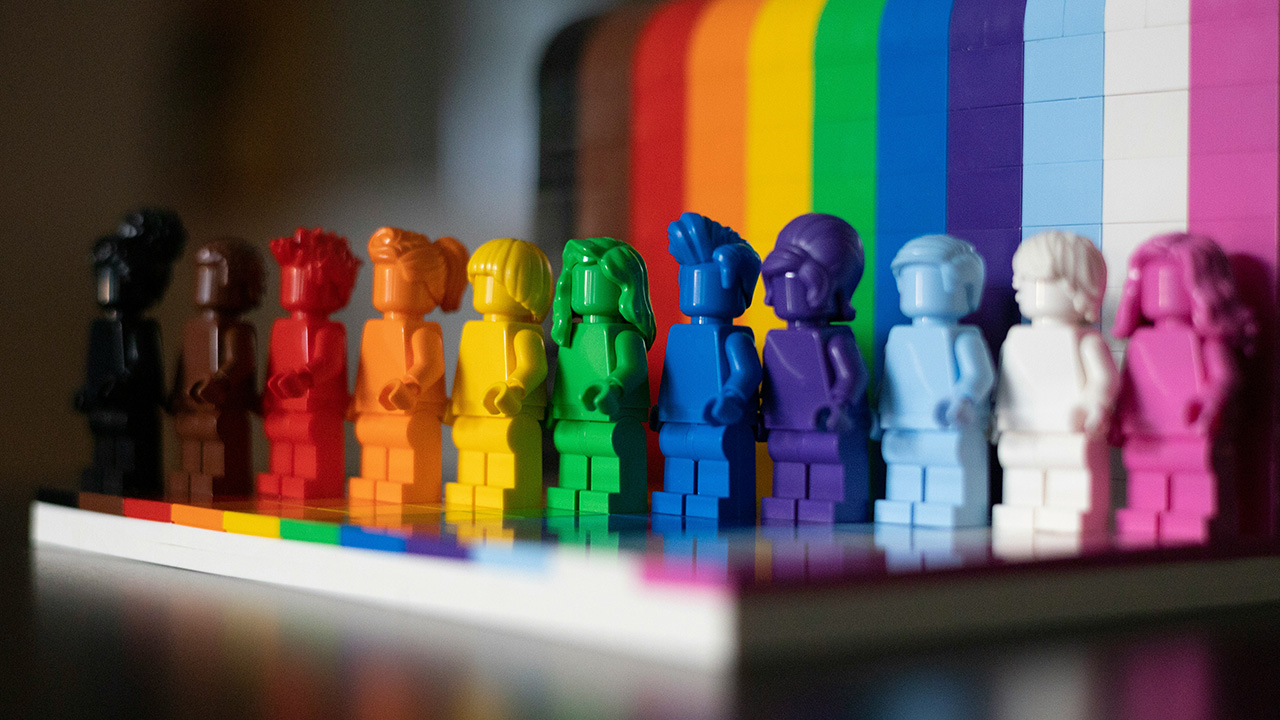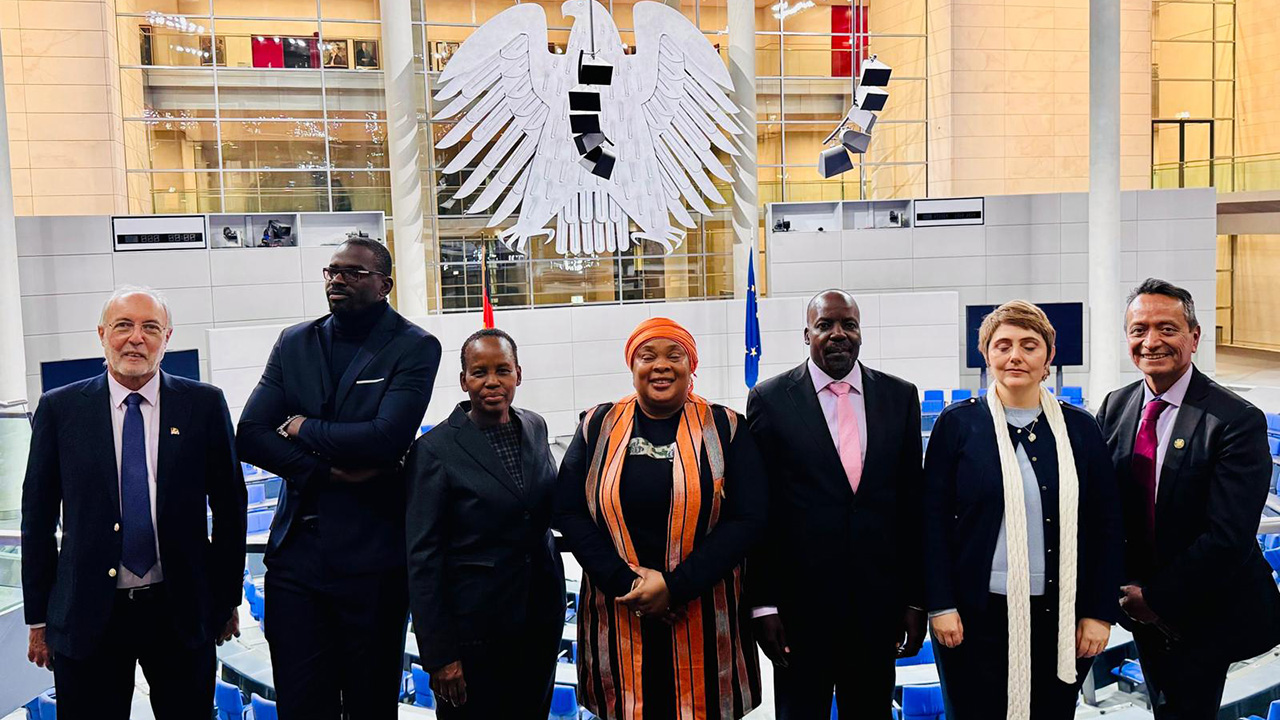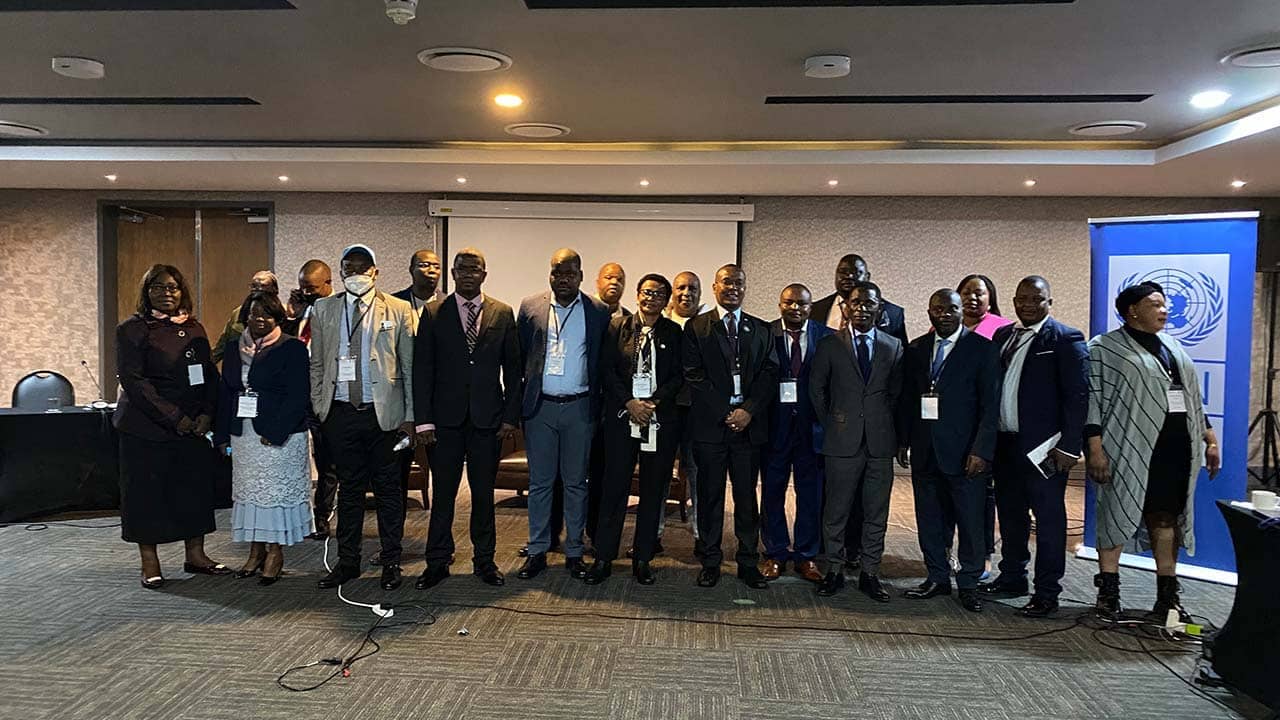
New York, Johannesburg, July 28, 2022
PGA and the United Nations Development Program’s Inclusive Governance Initiative (IGI) co-organized an in-person African Parliamentary Forum on Gender and Sexual Minorities on June 23 and 24, 2022, in Johannesburg, South Africa. Twenty-eight parliamentarians from 13 Sub-Saharan African countries - Angola, Botswana, Côte D’Ivoire, Democratic Republic of Congo (DRC), Eswatini, Lesotho, Malawi, Mozambique, Namibia, Seychelles, Uganda, Zambia and Zimbabwe - participated in this Forum. Civil society representatives from Eswatini, Malawi, Mozambique and South Africa also participated.
The purpose of the Forum was to:
- Provide a general overview for parliamentarians and enhance their knowledge of lesbian, gay, bisexual, transgender and intersex (LGBTI+) issues in the region.
- Share examples and best practices of the role of parliamentarians in promoting the LGBTI+ affirming legislation, supporting, and protecting human rights.
- Strengthen the network of parliamentarians committed to advancing human rights and inclusion of LGBTI+ people worldwide, so they can support and inspire each other in their efforts through cross-country and regional cooperation and encourage repealing criminalizing laws on consensual same-sex conduct and/or diverse gender expression and identity.
Key highlights of the discussion:
According to the UN Independent Expert on SOGI, 69 countries still criminalize same-sex relations. Young LGBTI+ people drop out of school three times more than non-LGBTI+ people; HIV/AIDS prevalence in trans people is 47 times more than in gay men, and 76 times more than among the general population.
- Angola:
- Botswana:
- Eswatini:
- Lesotho:
- Mozambique:
- Seychelles:
- Uganda:
- Zambia:
- Zimbabwe:
•• Following a process that took 10 years and included consultations, collection of data and a public-inclusive participation, the country adopted a law decriminalizing same-sex relationships in February 2021. The law also prohibits discrimination based on sexual orientation.
•• In 2019, the High Court ruled in favor of campaigners seeking to strike down jail sentences for same-sex relationships, declaring the punishment to be unconstitutional. After the ruling, the Parliament had to review and update the legislation to align it with the High Court’s decision.
•• Eswatini is a conservative society, where traditional leaders do not embrace LGBTI+ people and LGBTI+ representatives face attacks in the media.
•• The HIV/Aids pandemic was the entry point to start speaking about LGBTI+ rights.
•• Some progress: sodomy has been removed from the criminal code.
•• Homosexuality was decriminalized in 2010.
•• In 2015, Mozambique repealed articles 70 and 71 of the Penal Code which outlawed same-sex relationships. The process took around 10 years and involved several reforms and discussions (including on abortion and sexual harassment), public debates, and collaboration between civil society, the National Assembly, Ministry of Justice, and LGBTI+ experts.
•• In May 2016, the National Assembly voted to repeal the provisions criminalizing same-sex relations. The process also entailed an extensive discussion with the public and the church that had opposed decriminalization.
•• There is no discrimination in accessing health care for the LGBTI+ community in the Seychelles.
•• In May 2021, the Parliament of Uganda enacted the 2021 Sexual Offences Act (a law with discriminatory provisions against LGBTI+ people resembling the Anti-Homosexuality Act 2014 that wasannulled by the High Court due to procedural issues). The bill was no promulgated by the President and was sent back to Parliament. The bill is very ambiguous as, while containing important provisions onholding perpetrators of various gender-based violence (GBV) crimes to account and consolidating all sexual offences into a single piece of legislation, it perpetuates a toxic culture of impunity and victim-blaming in Uganda.
•• The Sexual Offences Act also criminalizes homosexuality and sex workers as well as false accusations of crimes of a sexual nature, which may discourage the women who would otherwise have been willing to seek justice.
•• Despite the Constitution in Zambia guaranteeing human rights, access to sexual and reproductive health and rights (SRHR) for girls are still stigma.
•• As a result of a culture of silence, there are no voices from civil society on the issues related to LGBTI+ people and, consequently, no champions [yet] in the Parliament to advance these rights.
•• While the law in Zimbabwe still criminalizes homosexuality, public opinion is progressive.
•• Zimbabwe has decriminalized the willful transfer of HIV/Aids and progress has been on-going on decriminalizing sodomy.
•• A Caucus on sexual and reproductive health and rights (SRHR), comprised by 43 MPs, was established. The Caucus organized HIV/AIDS Tour Buses, where parliamentarians, civil society, and the media meet with affected communities leading to awareness-raising and sensitization.
•• The Parliament assigned an MP to be a member of the key populations Forum - a platform established in 2017 where civil society organizations working with key populations meet and discuss – to later report to the Parliament about the issues.
•• Zimbabwe has adopted the SADC Parliamentary Forum Minimum Standards for the protection of the sexual and reproductive health of key populations in the SADC Region (2019).
Parliamentarians adopted the following actions:
- Côte D’Ivoire:
- DRC:
- Eswatini:
- Malawi:
- Seychelles:
- Zimbabwe:
•• A parliamentarian from Côte D’Ivoire pledged to design an advocacy for the National Assembly through the Committee on Women and Children and work on sensitizing the public and media.
•• A parliamentarian from DRC committed to sharing his experience from the Forum with his colleagues and constituents and facilitating dialogues between leaders and the public on how to address LGBTI+ people- related issues and design a message for the public.
•• A parliamentarian from Eswatini has publicly spoken for the rights and inclusion of LGBTI+ people in her country. In her most recent remarks, she posed a parliamentary question to the Ministry of Home Affairs to allow the registration of all NGOs, including LGBTI+ so they can operate freely without discrimination. This follows the decision by the Eswatini High Court to deny the registration of the NGO Eswatini Gender and Sexual Minorities (EGSM).
•• A parliamentarian from Malawi intends to:
▪ Conduct policy dialogue on human rights and issues related to LGBTI+ people to orient parliamentarians.
▪ Organize a meeting between traditional and religious leaders with a parliamentarycaucus on key populations to create more champions, provide information to policy makers to influence domestication of regional minimum standards, and decriminalize issues related to LGBTI+ people.
▪ Engage with CSOs to raise more awareness on human rights and LGBTI+ issues.
▪ Participate in the UNGA meeting in September and AU side meetings to raise more awareness for policy makers to review policies and legislation to accommodate and integrate LGBTI+ issues in the programs implementation.
•• The Seychellois parliamentarians (government and opposition) will bring a motion to Parliament so that SRHR issues include sexual and gender minorities. They will be implementing anti-bullying policies in education and will continue collaborating with CSOs on a hate crime bill and gender identity recognition. They will promote bills on equal marriage and adoption by same-sex partners.
•• Delegates vowed to make Seychelles an internationally-recognized LGBTI+ tourism paradise.
•• A Zimbabwean parliamentarian vowed to organize groups in the constituency who are advocating for equality and inclusion of minorities and marginalized groups.
Overall Recommendations to Parliamentarians:
- Monitor and follow-up on the implementation of your country’s international human rights-related commitments and make use of them to advance the rights of LGBTI+ people.
- Promote inclusive societies for peace and development, in line with Sustainable Development Goal 16 (SDG 16) through adopting the laws and policies that protect LGBTI+ people and oversee their implementation.
- Find other champions among parliamentarians.
- Use the resources: Key Populations Forum, the SADC PF report on minimum standards and the UNDP/PGA Parliamentary Handbook: Advancing the Human Rights and Inclusion of LGBTI People. Sign onto UNDP’s SparkBlue platform for real-time chat and relevant information.
- Monitor the budget on human rights issues.
- Be informed: compile evidence, facts, and information.
- Engage, learn, teach, sensitize, educate – be open to listen, create civic awareness. Do no harm, share messages of common values and rights.
- Engage and collaborate with LGBTI+ activists, CSOs, faith leaders, media, and include new actors.
- Be patient, be strategic, what works in your context. Change provokes fear and takes time. Gradual and incremental changes are needed.
- Use traditional and social media and use them strategically and intentionally to shift social norms. Hold the media accountable and use traditional and new platforms to advance your human rights messages.

